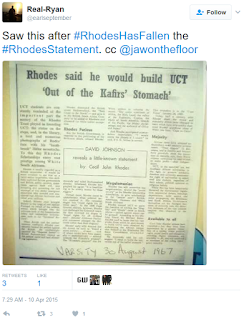Came across a tweet by @earlseptember as I was reading up on the whole #RhodesMustFall campaign that started at the University of Cape Town (UCT) and spread throughout the country. The tweet caught my attention because it references an article that was written 65 years after the death of Cecil John Rhodes and 48 years before the removal of his statue from the UCT steps.
— Earl September (@earlseptember) April 10, 2015
The original article titled Rhodes said he would build UCT ‘Out of the Kafirs’ Stomach’ was written by David Johnson and published in the Varsity Newspaper on 30 August 1967. Here is the original article. Look past the typos.
UCT students are constantly reminded of the important part the money of the Rhodes Trust played in founding UCT: the statue on the steps, and, in the library, a bust and numerous photographs of Rodes’ face with “tooth brush” Hitler moustache. To this day Rhodes Scholarships carry vast prestige among WHITE South Africans.
Rhodes is usually regarded as a British Imperialist. It would be more accurate to see him as a racist settler imperialist, who skilfully exploited British governments and British public opinion, sometimes against their will, into accepting and protecting the fait accompli of tiny settler immigrant minorities who invaded and conquered vast African territories and ruled over millions.
Indeed, Rhodes once brought Britain to the verge of war against Portugal on behalf of the settlers, events which brought him the criticism both of the humanitarian lobby and unidealistic businessmen, such as the “Investors’ Review”.
When British and the settlers’ interests conflicted, Rhodes consistently backed the settlers against the British. He unrelentingly opposed the “Imperial factor” — British Parliamentary control on the settlers’ racist and land alienating legislation.
Rhodes demanded the British annex Bechuanaland, the “Suez Canal to the North” — and give it to the British South Africa Company to be added to Rhodesia and alienated for white settler occupation.
Rhodes Furious
But the British Government, in response to the petitioning of the Bechuana chiefs, refused Rhodes’ demands and ruled Bechuanaland directly. Infuriated, Rhodes telegraphed his agent: “It is humiliating to be utterly beaten by these niggers.”
Though racist, Rhodes could be opportunistic when political tactics required it. his campaign slogan was “equal rights for all white men”. In the 1898 Cape General election, however, Rhodes was challenged by Coloured voters. He then switched his slogan to “Equal rights for all civilised men”. (Rhodes’ Afrikaner Nationalist successors changed the electorate rather than their slogans.)
Rhodes’ early wills directed that his money be used to "found a secret society…of men…each of whom would have been especially — mathematically — selected towards the Founder’s purpose”. The “Founder's purpose” was for White settlers to colonise the world: “The entire continent of Africa, the Holy Land, the valley of the Euphrates, Cyprus, the whole of South America, islands of the Pacific, the Malay Archipalego, and the seaboard of China and Japan”.
And Rhodes’ anticipated science-fiction imperialism: “I would annex the planets if I could,” he said if S.G. Millen is correct.
Megalomaniac
Rhodes’ last will, somewhat less megalomaniac, diluted the “secret society” to the Rhodes Scholarship Association, to give scholarships to the “master race”: British, Americans, Germans and White South Africans.
Rhodes wanted UCT to serve the function of uniting the “English” and “Dutch” races in South Africa — united against whom can be guessed! According to his lifelong friend Sir Herbert Baker, Rhodes used to boast that his vast profits (from which he gave money to build UCT) were obtained by underpaying the African miners who worked at the Kimberly De Beers Consolidated diamond mines.
He repeatedly told his colleagues: “I mean to build the university out of the kafirs’ stomach.” This revelation is in the “Cape Times”, January 24, 1920. Today, half a century after Rhodes’ death the world and especially Africa have changed in ways which have irrevocably shattered Rhodes’ grandiose ideas of White rule from “Cape to Cairo”.
Majority
African states have attained independence under majority governments. “These niggers” in Botswana, and in Zambia and Malawi have peacefully made the transition to majority rule, their White citizens continuing to stay — and to make profits — after independence.
UCT, in the post-1945 era, led Southern African universities in the fight to preserve academic freedom and university autonomy: the right of universities to admit staff and students, regardless of their colour, political opinions or religious beliefs.
While this has been temporarily thwarted by Government legislation, ministerial threats, bannings deportations, radio smears and press propaganda, the Rhodesian and South African Governments themselves are the besieged bastions of minority rule, the shrunken remnants of the vast colonial empires that dissolved in the 1950’s.
Available to all
Cecil John Rhodes’ dreams have crumbled — but they have been superseded by a greater vision: that of a society where political rights, social justice and education, including higher education, are available to all, and not restricted to members of the ruling immigrant minority.
That is the whole article as it was published in 1967. One can clearly see that CJR was one crazy imperialist and one can just wonder how far he would have taken his White rule ideology had he lived long enough. Its probably a good thing that they didn’t know how to perform heart transplants back then because I’m sure Cecil would have intentionally cut someones life short just to permanently fix his heart condition.
The Rhodes Must Fall campaign didn’t just start in 2015, it started in the 1950s but never amounted to anything until a student threw poo on the bronze statue that has sat in the same place for almost a century. That poo throwing incident got the attention of the country and probably the entire world and this had all politicians debating. Now that Rhodes has fallen, one can just wonder about the next big story to come out of South Africa.




Share your thoughts